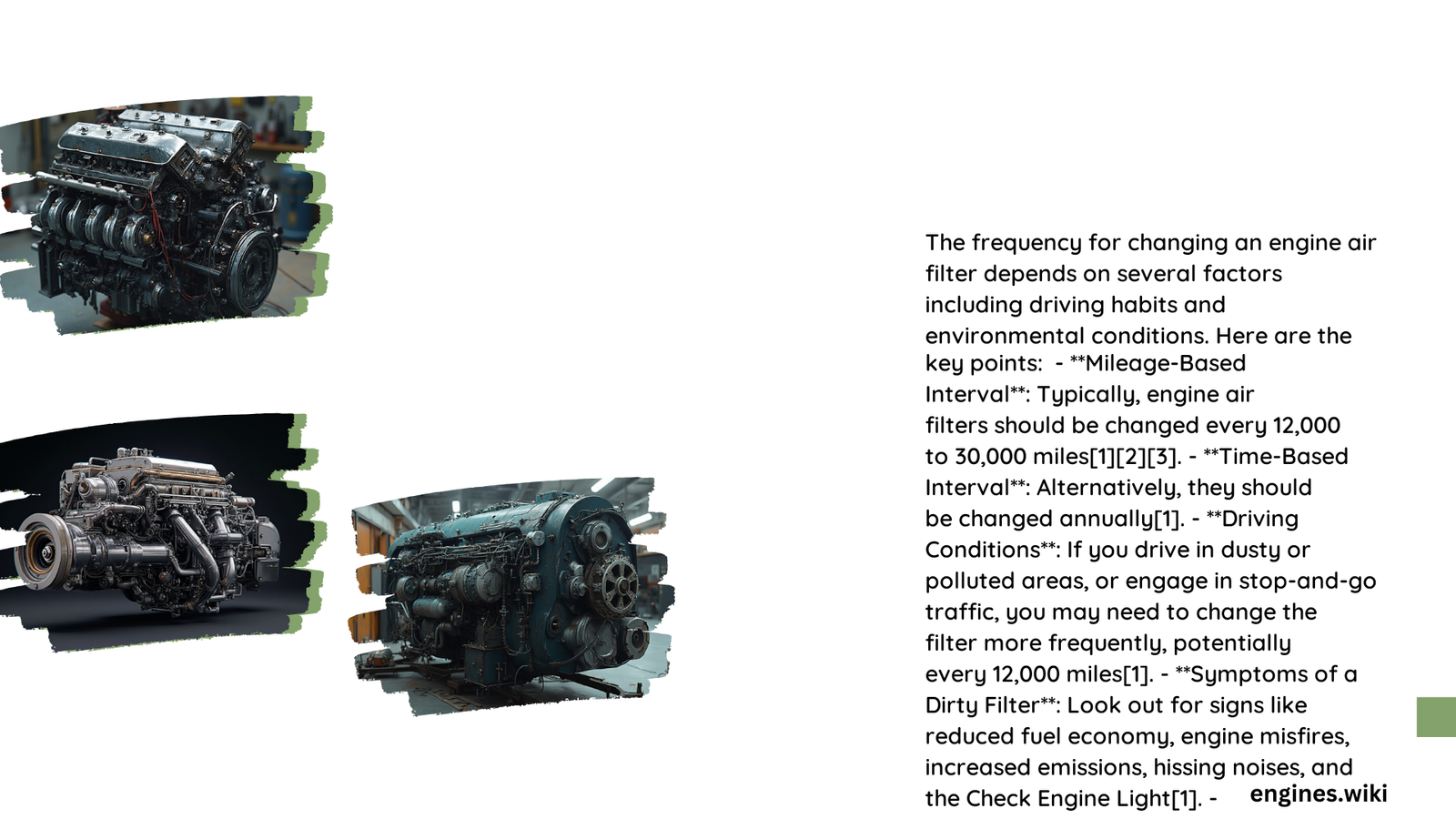Engine air filters play a crucial role in maintaining vehicle performance and efficiency. They prevent dust, debris, and contaminants from entering the engine, ensuring optimal combustion and protecting internal components. The frequency of changing engine air filters depends on various factors, including driving conditions, vehicle type, and manufacturer recommendations. Generally, it’s advised to replace the air filter every 12,000 to 15,000 miles or annually, whichever comes first. However, this can vary based on specific circumstances and driving habits.
What Are the Standard Recommendations for Air Filter Changes?
The standard recommendations for engine air filter changes are:
- Every 12,000 to 15,000 miles (20,000-24,000 kilometers)
- Once a year, whichever comes first
- More frequently in severe driving conditions
These guidelines apply to most vehicles, including cars, trucks, and SUVs. However, it’s essential to consult your vehicle’s owner manual for specific recommendations, as some manufacturers may have different intervals based on their engine design and filter type.
How Do Driving Conditions Affect Air Filter Change Frequency?

Driving conditions significantly impact how often you should change your engine air filter:
- Normal Driving Conditions:
- Mostly highway driving
- Clean air environments
-
Moderate climate
-
Severe Driving Conditions:
- Dusty or sandy areas
- Heavy urban traffic (stop-and-go)
- Industrial or polluted areas
- Off-road driving
In severe conditions, you may need to change your air filter every 6,000 to 12,000 miles. Regular inspections can help determine if more frequent changes are necessary.
What Are the Signs of a Clogged Air Filter?
Recognizing the signs of a clogged air filter can help you determine when it’s time for a replacement:
- Decreased Fuel Efficiency: A dirty air filter can reduce airflow to the engine, causing it to work harder and consume more fuel.
- Reduced Engine Performance: You may notice a slight decrease in acceleration or overall power.
- Check Engine Light: In some cases, a severely clogged filter can trigger the check engine light.
- Visible Dirt: Inspect the filter visually. If it appears dirty or has visible debris, it’s time for a change.
- Black Smoke: Excessive black exhaust smoke can indicate an overly rich fuel mixture due to insufficient airflow.
How Can You Inspect Your Engine Air Filter?
Regular inspection of your engine air filter can help you determine if it needs replacement:
- Locate the air filter housing: Usually a black plastic box under the hood.
- Open the housing: This typically involves unclipping or unscrewing the cover.
- Remove the filter: Carefully take out the filter element.
- Visual inspection: Look for dirt, debris, or discoloration.
- Light test: Hold the filter up to a bright light. If light passes through easily, it’s still good. If not, it’s time to replace.
Perform this inspection every 6,000 miles or during oil changes for optimal maintenance.
What Factors Influence Air Filter Lifespan?
Several factors can affect how long your engine air filter lasts:
| Factor | Impact on Air Filter Lifespan |
|---|---|
| Driving Environment | Urban areas with less dust allow for longer intervals. Rural or dusty areas require more frequent changes. |
| Vehicle Type | Larger engines or high-performance vehicles may require more frequent changes. |
| Filter Quality | Higher quality filters may last longer than budget options. |
| Driving Habits | Aggressive driving or frequent short trips can lead to faster filter degradation. |
| Climate | Extreme temperatures or high humidity can affect filter performance. |
Understanding these factors can help you adjust your maintenance schedule accordingly.
How Does Air Filter Type Affect Replacement Frequency?
The type of air filter in your vehicle can influence how often it needs to be replaced or serviced:
- Paper Filters:
- Most common type
- Disposable
-
Need replacement when dirty
-
Reusable Filters:
- Often made of cotton or synthetic materials
- Can be cleaned and reused
- Require regular cleaning (usually every 30,000 to 50,000 miles)
-
May have a higher upfront cost but can be more cost-effective long-term
-
High-Performance Filters:
- Designed for increased airflow
- May require more frequent cleaning or replacement
- Often used in sports or racing applications
Always follow manufacturer recommendations for your specific filter type to ensure optimal engine performance and longevity.
What Are the Benefits of Regular Air Filter Maintenance?
Maintaining a clean engine air filter offers several benefits:
- Improved Fuel Efficiency: A clean filter allows for optimal air-fuel mixture, improving fuel economy.
- Enhanced Engine Performance: Proper airflow ensures the engine runs at its best, maintaining power and acceleration.
- Reduced Emissions: A well-functioning air filter helps reduce harmful emissions.
- Extended Engine Life: By preventing contaminants from entering the engine, you protect internal components from premature wear.
- Cost Savings: Regular maintenance can prevent more expensive repairs down the line.
By adhering to recommended change intervals and performing regular inspections, you can ensure your vehicle operates at peak efficiency and performance.
Remember, while these guidelines provide a general framework for air filter maintenance, always consult your vehicle’s owner manual and consider your specific driving conditions when determining the optimal change frequency for your engine air filter.
References:
1. How Often to Change Engine Air Filter – FRAM
2. How Often Do You Need to Replace the Air Filter in a Car?
3. 4 Filters to Change in Your Car – DriveSafe Online®
